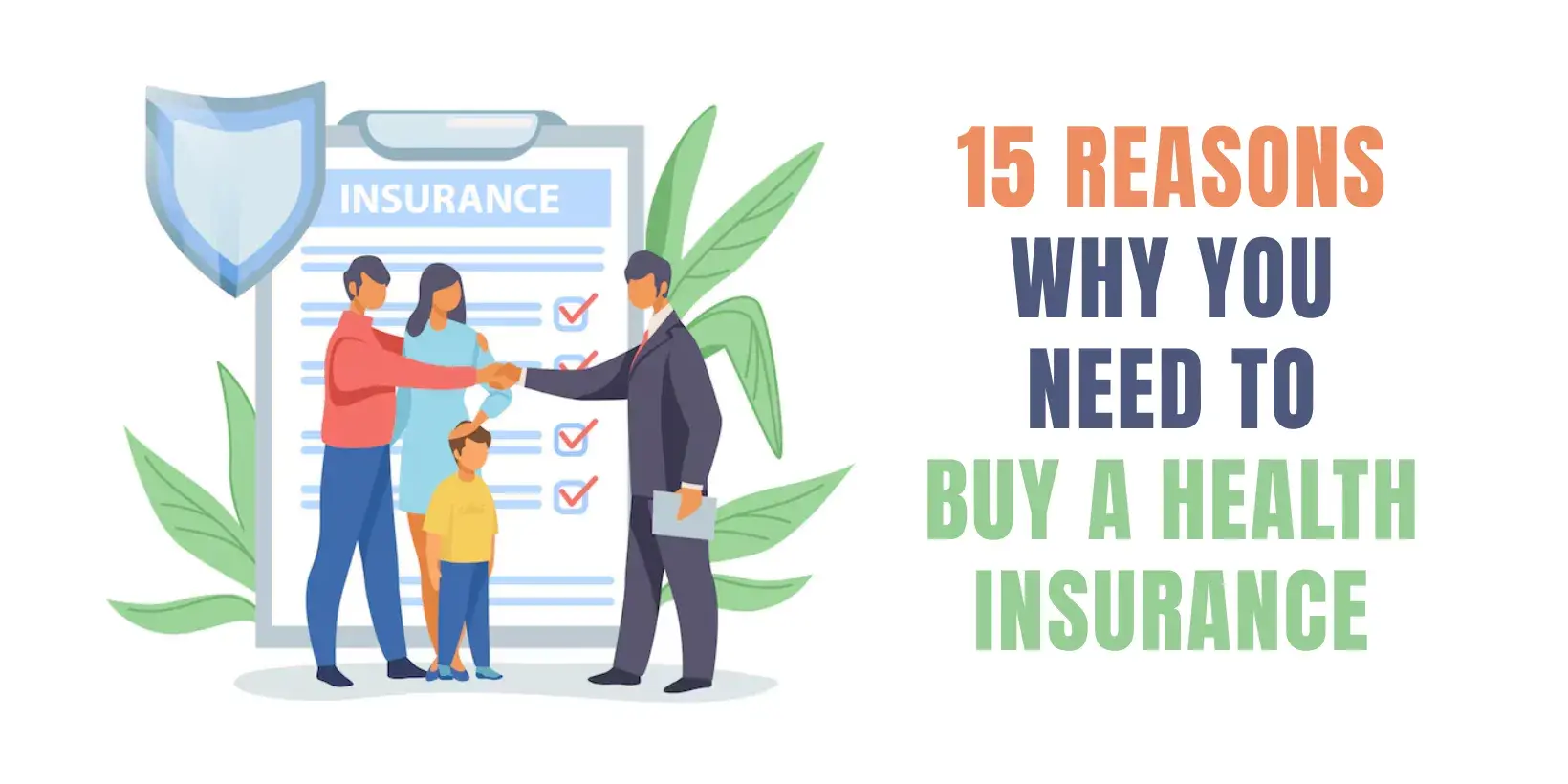
15 Reasons Why You Need to Buy a Health Insurance
In today's world, health insurance is more than just an option—it is a necessity. With rising healthcare costs and increasing medical uncertainties, having a reliable health insurance plan is essential for securing both your financial and medical well-being. Health insurance provides a safety net that helps cover medical expenses, ensuring that you and your loved ones receive quality healthcare without facing financial hardships. In this article, we will explore 15 key reasons why health insurance is an essential part of a secure and stable life.
15 Main Reasons Why You Need to Buy a Health Insurance
1. Protection Against High Medical Costs
One of the most significant reasons to buy a health insurance is to protect yourself against the high costs of medical treatment. Healthcare expenses have skyrocketed in recent years, making it difficult for many people to afford quality medical care without financial strain.- Rising Healthcare Expenses: Medical treatments, hospital stays, and surgeries can be expensive. A single hospitalization can cost thousands of dollars, draining your savings quickly.
- Coverage for Surgeries and Treatments: Health insurance covers a significant portion of medical expenses, including surgeries, diagnostic tests, and specialist consultations, ensuring that you receive proper treatment without excessive financial burden.
- Emergency Medical Costs: Unexpected medical emergencies can arise at any time. With health insurance, you won’t have to worry about how to pay for sudden hospitalization or critical treatments, giving you peace of mind.
2. Access to Quality Healthcare
Buying a health insurance ensures that you have access to quality healthcare services whenever you need them. Without insurance, many people delay or avoid medical treatment due to the high costs, which can lead to worsening health conditions.- Doctor Visits and Diagnostic Tests: Insurance covers routine doctor visits, diagnostic tests, and preventive screenings, helping detect potential health issues early.
- Timely Medical Care: Early diagnosis and treatment can prevent minor health issues from becoming serious. Insurance allows you to seek medical attention promptly without worrying about the cost.
- Better Treatment Options: With the right insurance plan, you can access advanced treatment options and specialized care that may otherwise be too expensive.
3. Coverage for Critical Illnesses
A critical illness can not only impact your health but also create a major financial burden. Certain health insurance plans offer coverage specifically for critical illnesses, providing financial support when you need it the most.- Serious Health Conditions: Diseases like cancer, heart disease, kidney failure, and stroke require expensive and long-term treatment. Critical illness insurance helps cover these costs.
- Financial Assistance During Recovery: Some insurance policies provide lump-sum payments upon diagnosis of a critical illness, helping cover treatment, medications, and even household expenses during recovery.
- Ensuring Long-Term Medical Care: Chronic conditions require ongoing treatment, which can be expensive. Health insurance helps manage these costs without putting financial pressure on you or your family.
4. Cashless Treatment and Hospitalization
One of the major benefits to buy a health insurance is the option of cashless hospitalization. Many insurance providers have tie-ups with hospitals, allowing policyholders to receive treatment without paying upfront.- Immediate Admission Without Payment: With cashless treatment, you can get admitted to a hospital without worrying about arranging money immediately.
- Network Hospitals for Easy Processing: Insurance companies have a network of hospitals where policyholders can receive treatment without handling the paperwork themselves.
- Reduced Out-of-Pocket Expenses: Cashless hospitalization means you don’t have to pay large amounts at the time of admission, making medical treatment more accessible and stress-free.
5. Emergency Medical Expenses
Medical emergencies can occur unexpectedly, and without insurance, the financial burden can be overwhelming. Health insurance provides coverage for:- Ambulance services and emergency treatments
- Immediate medical attention for accidents and sudden illnesses
- Quick access to necessary procedures without financial stress
6. Financial Security for Your Family
Health insurance is not just about personal protection—it also safeguards the well-being of your entire family. Many insurance providers offer family floater plans that provide coverage for multiple family members under a single policy.- Family Floater Plans: These plans ensure that your spouse, children, and even elderly parents are covered under one policy, reducing the need for multiple individual policies.
- Coverage for Different Age Groups: Family plans cater to different medical needs, including maternity coverage for expectant mothers and healthcare support for aging parents.
- Peace of Mind for Loved Ones: Knowing that your family is financially protected against medical emergencies gives you confidence and security.
7. Maternity and Newborn Coverage
Many health insurance policies provide coverage for maternity and newborn care, helping expectant mothers manage healthcare costs related to childbirth.- Prenatal and Postnatal Expenses: Covers doctor visits, tests, and medications needed before and after childbirth.
- Delivery and Hospitalization Costs: Ensures financial protection for normal and C-section deliveries.
- Newborn Baby Coverage: Some policies include medical expenses for the newborn, including vaccinations and initial health checkups.
8. Tax Benefits of Health Insurance
Another advantage of health insurance is the tax benefits it offers. Many governments encourage people to invest in or buy a health insurance by providing tax deductions on insurance premiums.- Tax Deductions on Premiums: Under various tax laws, individuals can claim deductions for the premiums paid on their health insurance policies.
- Reduced Taxable Income: By investing in health insurance, you lower your taxable income, which helps you save money while securing your health.
- Government Incentives: Some governments provide additional incentives for individuals who purchase insurance plans, making it even more affordable.
9. Protection from Medical Debt
Medical expenses can quickly spiral out of control, leading to significant debt. If you buy a health insurance, then:- You avoid borrowing money for medical bills.
- Reduces financial stress caused by unexpected health issues.
- Prevents savings from being wiped out due to medical costs.
10. Preventive Care Coverage
Many insurance policies cover preventive care, which helps detect and prevent illnesses early:- Routine check-ups and screenings
- Vaccinations and early disease detection
- Encourages a proactive approach to health
11. Mental Health Support
Mental health is just as important as physical health. Some policies cover:- Therapy and counseling sessions
- Mental health treatments and medications
- Support for anxiety, depression, and other disorders
12. Daycare and OPD Benefits
Short hospital stays and outpatient care can be expensive, but insurance helps by covering:- Minor surgeries that don’t require long hospitalization
- Outpatient consultations and medications
- Diagnostic tests and doctor visits
13. Alternative Treatments Coverage
Certain health insurance plans also cover alternative treatments such as:- Ayurveda, Homeopathy, and Unani therapies
- Acupuncture and chiropractic care
- Holistic treatments that focus on overall well-being
14. Peace of Mind
Knowing that you are financially protected against health emergencies brings:- Less stress about hospital bills
- Confidence in seeking medical care when needed
- Overall better quality of life
15. Future Security
Most policies offer lifelong renewability, which ensures:- Continuous coverage as you age
- Protection from increasing medical costs in old age
- Health security for a lifetime
Conclusion
Health insurance is an essential investment in your well-being and financial security. By covering medical expenses, offering preventive care, and protecting against large hospital bills, it provides peace of mind and ensures a secure future for you and your family. If you haven’t buy a health insurance yet, now is the time to take action and secure your health for the years ahead.All Categories
Recent Posts
avish0 Comments
Critical Illness Insurance: Do You Really Need It in 2026?
avish0 Comments
15 Reasons Why You Need to Buy a Health Insurance
avish0 Comments




